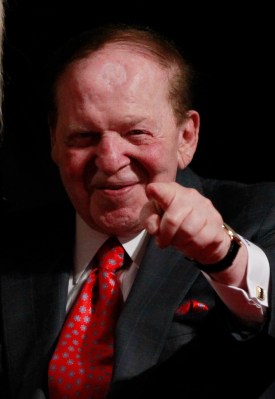U.S. Under Secretary for Political Affairs Wendy Sherman in Geneva on October 15, 2013.
Octogenarian billionaire and GOP megdaonor Sheldon Adelson caused a ruckus Wednesday by suggesting that the U.S. lob a nuclear missile into the Iranian desert. The idea, as Adelson described it, was to issue a warning shot that would show Tehran “we mean business” in nuclear negotiations. American media outlets hyped Adelson’s characteristically hawkish fantasy. But Iran appeared unperturbed by his talk of a nuclear first strike.
That’s because the real furor in Tehran now is over another provocative remark, this one from Wendy Sherman, a senior State Department official who is America’s lead negotiator in talks with Iran. In recent testimony to Congress, Sherman said that the U.S. had to be cautious about cutting a deal with Tehran, because recent experience with the Iranians over their nuclear program—which Iran has repeatedly concealed—shows that “deception is part of the DNA.”
“Sherman’s DNA comment has created a big stir in Iran,” says Karim Sadjadpour, an Iran expert at the Carnegie Endowment for International Peace. “Adelson not so much.”
How could a diplomatic slight like Sherman’s outweigh Adelson’s talk of a nuclear first strike?
One reason has to do with the messengers. Adelson may bankroll Republicans, but he’s not setting American policy. And no one takes seriously his fantasy of a nuclear shot across Tehran’s bow.
Sherman, by contrast, speaks directly for the U.S. government. That’s why conservative leaders and media outlets in Iran are lashing out at what they call Sherman’s insult, uttered at a Senate hearing earlier this month. One hard-line paper is calling for a boycott of the talks if she’s present. A cartoon published by Iran’s Fars news agency depicts Sherman as a broom-riding witch.
To some degree, the fuss over Sherman’s words is a function of internal politics in Iran, where conservatives are looking for reasons to undermine talks with America. (The three-week delay in seizing on Sherman’s words suggests orchestrated outrage.)
But the flap also goes to a core problem with the nuclear talks: mutual distrust. The U.S. worries that Iran is feigning flexibility to win relief from sanctions, with no real intent to halt its nuclear program. Iran thinks America sees the nuclear issue as a stalking horse for regime change. The parallel suspicions could make a deal impossible.
This is why Sherman trumps Adelson in Tehran. Iran’s leaders are smart enough to know America’s not going to nuke them. They’re also smart enough to know that suspicion of them may be, well, in our DNA.
At a press briefing earlier this week, a State Department spokeswoman downplayed the anti-Sherman campaign, saying the U.S. and Iran have a three-decade history of mistrust that both are now trying to overcome. “This mistrust has deep roots, and we don’t think it can be overcome overnight,” said spokeswoman Marie Harf.
“Maybe,” asked a reporter, “this is something that stem cells can fix?”
Or maybe it simply can’t be fixed.


